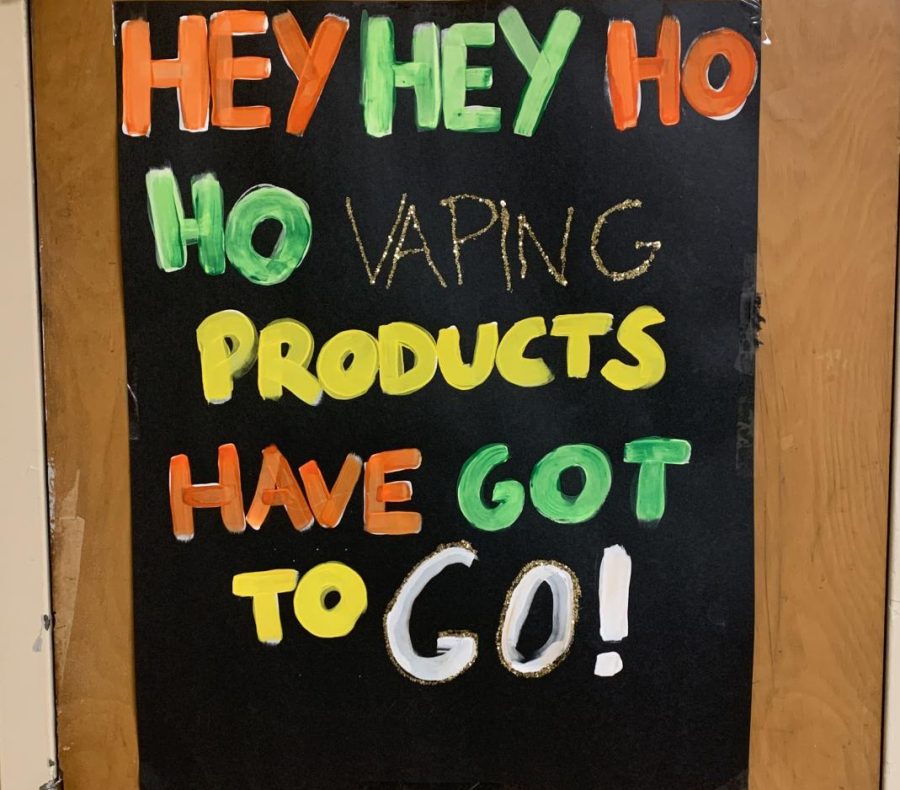Why Do We Vape?
An anti-vaping sign hangs outside a restroom.
June 9, 2022
Editors’ Note: Due to the sensitive nature of some material, pseudonyms have been used in place of students’ names.
It is difficult, these days, to go virtually anywhere without running into someone using a vape pen. They are everywhere: in the mall, at the park, even at school. Many ask, “Why do we vape?” The answer varies—social image, marketing, or smoking habits, among others. The consequences to one’s health can cause people to consider quitting, but, it may be harder than teenagers think to put down the e-cigarette.
There have been issues at Edison High this year regarding vaping, specifically in student restrooms.
“Vaping in the bathrooms has been out of control,” said AE, a freshman. “I can’t even use the bathroom sometimes with all the kids vaping in there.”
Administration has tried to address the issue in a number of ways, some of which have included locking restrooms and collecting students’ phones before leaving class. However, the problem persists. But the question remains: Why are students vaping in the first place?
“I started vaping in seventh grade, and I honestly don’t know why,” said GM, a senior. “It can be highly addicting. Some people want to blame their personal problems as being a reason for vaping, but some people don’t want to stop something that feels good. It’s not the nicotine that is addicting. It’s the flavor.”
Social image in high school is what determines many relationships, how students are treated, and the choices they make. Marketing media creates a positive image for a product, and hashtags and reposts create an internet buzz chain that leads to a trending topic. For instance, fast food chains like McDonald’s or Wendy’s emphasize the positives of their food, although it is often harmful to long-term health. Vaping, which often appeals more to a younger audience, is viewed through the same lens.
“All of my friends vape, which is why I started to,” said sophomore KA. “It helps me de-stress, and I smoke to cope with a lot of problems I have.”
Newport Academy is a teen and adolescent drug abuse treatment facility. According to their website, “One study followed 2,500 ninth-grade students from 10 Los Angeles high schools. Those who had used e-cigarettes at least once were more likely to start smoking cigarettes within the next year. Moreover, teens who vape are taking in even more nicotine than they would get from traditional cigarettes.”
“I believe it’s definitely a social norm,” said MJ, a senior. “Honestly, people want to fit in and everyone does it to fit in. A long time ago cigarettes were a big thing in high schools and now it’s changed to vaping.”
Although e-cigarettes are safer than other drugs such as fentanyl and heroin, the nicotine in vape pens can become addicting. Nausea, vomiting, headaches, and lung cancer are the most common side effects.
“Like other drugs,” said Newport Academy, “nicotine releases dopamine in the brain. In fact, research suggests that nicotine may be as addictive as heroin and cocaine. Hence, teen vaping carries a high risk of addiction. Therefore, it primes the brain for addiction to even more potent drugs in the future.”
Vaping’s original purpose was to offer cigarette smokers a safer way to quit smoking. But flavors such as “strawberry milkshake” or “mango ice” distract users from the harmful effects nicotine has on their bodies.
Its popularity with the younger, newer generation has caused an increase in vaping in high schools. Mental health can play a role in vaping habits, which can be used as a relaxer coping mechanism. The “gateway drug” can be unsuccessful for quitting smoking but can be mistaken as an outlet for those who need an escape to cope with their mental health issues.
Communication between adolescents and adults is key to avoiding high risks of addiction and poor health from vaping. For those looking for more information, the State of New Jersey offers resources on the facts of vaping here, as well as help quitting through the New Jersey Quitline at 1-800-866-NJ-STOPS.























































































